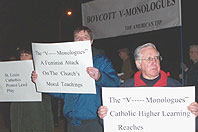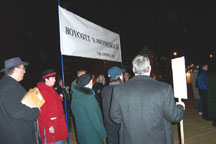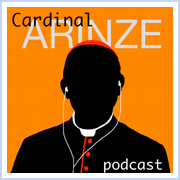From: Matthew 6:7-15An Upright Intention in Almsgiving, Prayer and Fasting (Continuation)(Jesus said to His disciples:) [7] "And in praying do not heap up empty phrases as the Gentiles do; for they think that they will be heard for their many words. [8] Do not be like them, for your Father knows what you need before you ask Him. [9] Pray then like this: Our Father who art in Heaven, hallowed be Thy name. [10] Thy kingdom come, Thy will be done, on earth as it is in Heaven. [11] Give us this day our daily bread; [12] And forgive us our debts, as we also have forgiven our debtors; [13] And lead us not into temptation, but deliver us from evil. [14] For if you forgive men their trespasses, your Heavenly Father also will forgive you; [15] but if you do not forgive men their trespasses, neither will your Father forgive your trespasses."
**************
Commentary:
7-8. Jesus condemns the superstitious notion that long prayers are needed to attract God's attention. True piety is not so much a matter of the amount of words as of the frequency and the love with which the Christian turns towards God in all the events, great or small, of his day. Vocal prayer is good, and necessary; but the words count only if they express our inner feelings.
9-13. The "Our Father" is, without any doubt, the most commented-on passage in all Sacred Scripture. Numerous great Church writers have left us commentaries full of poetry and wisdom. The early Christians, taught by the precepts of salvation, and following the divine commandment, centered their prayer on this sublime and simple form of words given them by Jesus. And the last Christians, too, will raise their hearts to say the "Our Father" for the last time when they are on the point of being taken to Heaven. In the meantime, from childhood to death, the "Our Father" is a prayer which fills us with hope and consolation. Jesus fully realized how helpful this prayer would be to us. We are grateful to Him for giving it to us, to the Apostles for passing it on to us and, in the case of most Christians, to our mothers for teaching it to us in our infancy. So important is the Lord's Prayer that from apostolic times it has been used, along with the Creed, the Ten Commandments and the Sacraments, as the basis of Christian catechesis. Catechumens were introduced to the life of prayer by the "Our Father", and our catechisms today use it for that
purpose.
St. Augustine says that the Lord's Prayer is so perfect that it sums up in a few words everything man needs to ask God for (cf. "Sermon", 56). It is usually seen as being made up of an invocation and seven petitions--three to do with praise of God and four with the needs of men.
9. It is a source of great consolation to be able to call God "our Father"; Jesus, the Son of God, teaches men to invoke God as Father because we are indeed His children, and should feel towards Him in that way.
"The Lord [...] is not a tyrannical master or a rigid and implacable judge; He is our Father. He speaks to us about our lack of generosity, our sins, our mistakes; but He also does so in order to free us from them, to promise us His friendship and His love [...]. A child of God treats the Lord as his Father. He is not obsequious and servile, he is not merely formal and well-mannered; he is completely sincere and trusting" ([St] J. Escriva, "Christ Is Passing By", 64).
"Hallowed by Thy name": in the Bible a person's "name" means the same as the person himself. Here the name of God means God Himself. Why pray that His name be hallowed, sanctified? We do not mean sanctification in the human sense--leaving evil behind and drawing closer to God--for God is Holiness Itself. God, rather, is sanctified when His holiness is acknowledged and honored by His creatures--which is what this first petition of the "Our Father" means (cf. "St. Pius Catechism", IV, 10).
10. "Thy Kingdom come": this brings up again the central idea of the Gospel of Jesus Christ--the coming of the Kingdom. The Kingdom of God is so identical with the life and work of Jesus Christ that the Gospel is referred to now as the Gospel of Jesus Christ, now as the Gospel of the Kingdom (Matthew 9:35). On the notion of the Kingdom of God see the commentary on Matthew 3:2 and 4:17. The coming of the Kingdom of God is the realization of God's plan of salvation in the world. The Kingdom establishes itself in the first place in the core of man's being, raising him up to share in God's own inner life. This elevation has, as it were, two stages--the first, in this life, where it is brought about by grace; the second, definitive stage in eternal life, where man's elevation to the supernatural level is fully completed. We for our part need to respond to God spontaneously, lovingly and trustingly.
"Thy will be done": this third petition expresses two desires. The first is that man identify humbly and unconditionally with God's will--abandonment in the arms of his Father God. The second that the will of God be fulfilled, that man cooperate with it in full freedom. For example, God's will is to be found in the moral aspect of the divine law--but this law is not forced on man. One of the signs of the coming of the Kingdom is man's loving fulfillment of God's will. The second part of the petition, "on earth as it is in Heaven", means that, just as the angels and saints in Heaven are fully at one with God's will, so--we desire--should the same thing obtain on earth.
Our effort to do God's will proves that we are sincere when we say the words, "Thy will be done." For our Lord says, "Not every one who says to Me, `Lord, Lord' shall enter the Kingdom of Heaven, but he who does the will of My Father who is in Heaven." (Matthew 7:21). "Anyone, then, who sincerely repeats this petition, `Fiat voluntas tua', must, at least in intention, have done this already" (St. Teresa of Avila, "Way of Perfection", chapter 36).
11. In making this fourth petition, we are thinking primarily of our needs in this present life. The importance of this petition is that it declares that the material things we need in our lives are good and lawful. It gives a deep religious dimension to the support of life: what Christ's disciple obtains through his own work is also something for which he should implore God--and he should receive it gratefully as a gift from God. God is our support in life: by asking God to support him and by realizing that it is God who is providing this support, the Christian avoids being worried about material needs. Jesus does not want us to pray for wealth or to be attached to material things, but to seek and make sober use of what meets our needs. Hence, in Matthew as well as in Luke (Luke 11:2), there is reference to having enough food for every day. This fourth petition, then, has to do with moderate use of food and material things--far from the extremes of opulence and misery, as God already taught in the Old Testament "Give me neither poverty nor riches; feed me with the food which is needful for me, lest I be full, and deny Thee, and say, `Who is the Lord?' or lest I be poor, and steal, and profane the name of my God" (Proverbs 30:8).
The Fathers of the Church interpreted the bread asked for here not only as material food but also as referring to the Blessed Eucharist, without which our spirit cannot stay alive.
According to the "St. Pius V Catechism" (cf. IV, 13, 21) the Eucharist is called our daily bread because it is offered daily to God in the Holy Mass and because we should worthily receive it, every day if possible, as St. Ambrose advises: "If the bread is daily, why do you take it only once a year [...]? Receive daily what is of benefit to you daily! So live that you may deserve to receive it daily!" ("De Sacramentis", V, 4).
12. "Debts": clearly, here, in the sense of sin. In the Aramaic of Jesus' time the same word was used for offense and debt. In this fifth petition, then, we admit that we are debtors because we have offended God. The Old Testament is full of references to man's sinful condition. Even the "righteous" are sinners. Recognizing our sins is the first step in every conversion to God. It is not a question of recognizing that we have sinned in the past but of confessing our
present sinful condition. Awareness of our sinfulness makes us realize our religious need to have recourse to the only One who can cure it. Hence the advantage of praying insistently, using the Lord's Prayer to obtain God's forgiveness time and again.
The second part of this petition is a serious call to forgive our fellow-men, for we cannot dare to ask God to forgive us if we are not ready to forgive others. The Christian needs to realize what this prayer implies: unwillingness to forgive others means that one is condemning oneself (see the notes on Matthew 5:23-24 and 18:21:21-35).
13. "And lead us not into temptation": "We do not ask to be totally exempt from temptation, for human life is one continuous temptation (cf. Job 7:1). What, then, do we pray for in this petition? We pray that the divine assistance may not forsake us, lest having been deceived, or worsted, we should yield to temptation; and that the grace of God may be at hand to succor us when our strength fails, to refresh and invigorate us in our trials" ("St. Pius V Catechism", IV, 15, 14).
In this petition of the "Our Father" we recognize that our human efforts alone do not take us very far in trying to cope with temptation, and that we need to have humble recourse to God, to get the strength we need. For, "God is strong enough to free you from everything and can do you more good than all the devils can do you harm. All that God decrees is that you confide in Him, that you draw near Him, that you trust Him and distrust yourself, and so be helped; and with this help you will defeat whatever hell brings against you. Never lose hold of this firm hope [...] even if the demons are legion and all kinds of severe temptations harass you. Lean upon Him, because if the Lord is not your support and your strength, then you will fall and you will be afraid of everything" (St. John of Avila, "Sermons, 9, First Sunday of Lent").
"But deliver us from evil": in this petition, which, in a way, sums up the previous petitions, we ask the Lord to free us from everything our enemy does to bring us down; we cannot be free of him unless God Himself free us, in response to our prayers.
This sentence can also be translated as "Deliver us from the Evil One", that is to say, the devil, who is in the last analysis the author of all evils to which we are prone.
In making this request we can be sure that our prayer will be heard because Jesus Christ, when He was on the point of leaving this world, prayed to the Father for the salvation of all men: "I do not pray that Thou shouldst take them out of the world, but that Thou shouldst keep them from the evil one" (John 17:15).
14-15. In verses 14 and 15 St. Matthew gives us a sort of commentary of our Lord on the fifth petition of the "Our Father".
A God who forgives is a wonderful God. But if God, who is thrice-holy, has mercy on the sinner, how much more ought we to forgive others--we sinners, who know from our own experience the wretchedness of sin. No one on earth is perfect. Just as God loves us, even though we have defects, and forgives us, we should love others, even though they have defects, and forgive them. If we wait to love people who have no defects, we shall never love anyone. If we wait until others mend their ways or apologize, we will scarcely ever forgive them. But then we ourselves will never be forgiven. "All right: that person has behaved badly towards you. But, haven't you behaved worse towards God?" ([St] J. Escriva, "The Way", 686).
Thus, forgiving those who have offended us makes us like our Father, God: "In loving our enemies there shines forth in us some likeness to God our Father, who, by the death of His Son, ransomed from everlasting perdition and reconciled to Himself the human race, which before was most unfriendly and hostile to Him" ("St. Pius V Catechism", IV, 14, 19).
***************************
Source: "The Navarre Bible: Text and Commentaries". Biblical text taken from the Revised Standard Version and New Vulgate. Commentaries made by members of the Faculty of Theology of the University of Navarre, Spain. Published by Four Courts Press, Kill Lane, Blackrock, Co. Dublin, Ireland.
Reprinted with permission from Four Courts Press and Scepter Publishers, the U.S. publisher.











